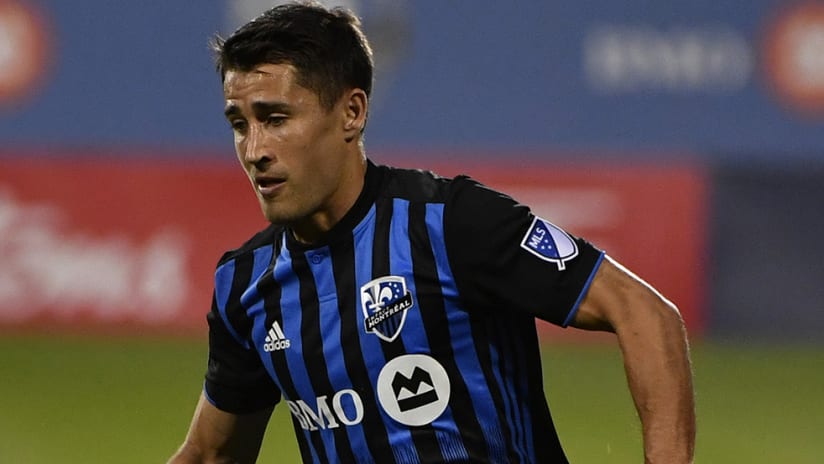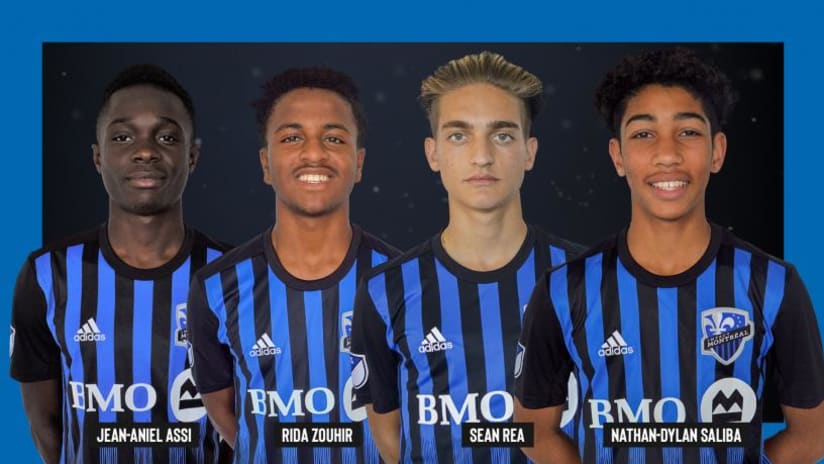MONTREAL – Eight starts, nine goals, one assist, six wins and an Audi 2015 MLS Cup Playoffs spot.
Those accomplishments don’t tell the whole story of Didier Drogba’s influence on the Montreal Impact – what about his hold-up play, for example? – but they offer a glimpse into what the “Drogba Effect” has been on the field.
Drogba, however, transcends his sport. There’s more to his influence than the game itself. Some of it isn’t measurable: the aura surrounding a Drogba-led team, the love that Impact supporters have given him, the sense of belonging he passes on to Academy kids.
But some figures do offer a glance at the off-the-field Drogba Effect.
In that regard, the general assessment is crystal-clear, according to Impact executive vice-president of soccer operations and Stade Saputo, Richard Legendre. He said every single performance indicator has improved over the past weeks.
“Whether we’re talking jersey sales – we could have sold more Didier Drogba jerseys if we’d had more to sell, and we’ll have more to sell in the future – concession sales – inevitably, because the stadium’s full – ratings, performance on social media, it has greatly improved,” Legendre told reporters on Wednesday morning. “On all fronts, we feel a new energy and a new pride.”
The most visible evidence that the effect is real, on non-match days, has been Drogba No. 11 jerseys popping up all over Montreal. And with the club running out of stock, fans that wanted their jersey had to get it shipped from the United States.
Fans really wanted their jersey: Drogba has only been in MLS for three months, yet he has cracked the Top 20 list of jersey sales on MLSStore.com for 2015. He already represents 38 percent of Montreal jersey sales on the official store.
Those jerseys – and Ivory Coast jerseys as well – have filled Stade Saputo. Since Drogba’s debut on Aug. 22, Montreal have sold out all 20,801 seats for five of six home games, including this Sunday’s Decision Day fixture against Toronto FC (5 pm ET; TSN4, TSN5, RDS in Canada; MLS LIVE in US). The last eight home games have drawn crowds averaging more than 20,000, roughly 4,000 more than Montreal’s average attendance for 2015 before then.
In fact, 2015 has already been Montreal’s best-attended season in all competitions since joining MLS. More than 460,000 fans have showed up at Impact games, compared to their previous best of 420,000 in their 2012 inaugural season. Montreal’s 2014-15 CONCACAF Champions League run boosted those numbers; the club even set an attendance record for professional club soccer in Canada when 61,004 fans packed the Olympic Stadium for Montreal's CCL final loss to Club América.
“We’re feeling a renewed sense of pride in the Bleu-Blanc-Noir,” Legendre said. “It’s extremely important for us that this pride be durable because the numbers we had in the past, especially in 2014, were far from satisfying for the league.”
Legendre’s wish may just come true. One month into their 2016 season ticket campaign, Montreal have already registered their best-ever renewal rate. It used to stand at 81 percent. Next season, at least 84 percent of their season ticket holders will be back. Better yet, 2,000 new season ticket holders have committed, compared to Montreal’s previous best of 1,700.
“Clearly, there’s been a Didier Drogba Effect,” Legendre said. “But I wouldn’t say it’s been the only effect because crowds were already up in July. But we’ve gone from 17,000, on average, to sellouts almost every single time. There's been an effect, but I think that we can't minimize the importance of the turnaround that’s happened on the field.”
After a tough month of August, Mauro Biello replaced Frank Klopas as head coach. Montreal have gone 6-2-2 since then. They won twice on the road, shored things up at the back and looked a team transformed.
Drogba scored nine of their 16 goals, too. The Impact have improved as a team, but that can’t be minimized, either.
“When you look at the last 10 games, it’s completely changed,” Legendre said. “Positive results on the field, Didier Drogba's arrival and playoffs race. That’s several positive elements at once.”
Fans have flocked to the stadium, and they’ve supported the team from the comfort of their own homes, too. Both TV stations (RDS and TVA Sports) that broadcast Impact games told MLSsoccer.com that they are also seeing a positive effect.
“The sample size is small for the moment, but for the handful of games that we’ve broadcast since Drogba joined the Impact, the ratings have virtually doubled,” said Simon Céré, RDS’ manager of communications and public relations, in an email to MLSsoccer.com.
- Get more Montreal news at ImpactMontreal.com
The same holds true for TVA Sports’ numbers.
“Clearly, passion for soccer in Quebec and throughout Canada is growing – for instance, the CONCACAF Champions League Final drew an average of 402,000 viewers, for a 13.3 percent market share, with a peak-hour audience of 722,000 viewers, which is a record for Impact games on TVA Sports,” said Groupe TVA’s press officer Audrey St-Pierre via email, quoting numbers from broadcast measurement firm Numeris. “Didier Drogba’s signing could only keep this momentum going.”
Drogba is also drawing a generous amount of media. Almost a year to the date after Legendre blasted the media for their unbalanced coverage of the Impact, he spoke of the club’s satisfaction with the improved treatment, an assessment validated by media information broker Influence Communication.
In terms of sports news coverage, the NHL’s Montreal Canadiens have maintained the best media prominence in the province of Quebec from 2014 to the first 10 months of 2015. Roughly seven sports news items out of 10 are dedicated to the Canadiens.
But the Impact have so far quadrupled their sports media prominence in 2015, according to Influence Communication’s data, leaving bits and pieces to other NHL teams, Montreal-born tennis player Eugenie Bouchard and the Montreal Alouettes, who close out the top 5. (Influence Communication will publish their full report for 2015 in late December.)
For Influence Communication president Jean-François Dumas, there is no doubt that, while Montreal’s CCL run drove great interest for the team, Drogba has clearly been the “media epicenter” behind that momentum.
That’s especially true outside of Quebec – “Mexican media gave the Impact 15 times more coverage than Quebec media,” he notes – and Dumas is adamant that a formidable window of opportunity has opened for the Impact to firmly establish themselves as the most important pro sports team in Montreal behind the Canadiens. Bouchard has struggled to build on an impressive 2014, while the Alouettes have badly underachieved.
“It’s the Impact’s year,” Dumas told MLSsoccer.com by phone. “From a media standpoint, we’ve called it the Impact’s year. It’s been exceptional in terms of media coverage, although they’re still far behind the Canadiens, and it will remain so.”
Dumas points out, however, that Drogba and the Montreal Impact are still more talked about overseas than in their own market. But the Effect is in motion.
“I feel like the Impact will most probably be able to capitalize on this next year because the exposure will allow them to build their base of fans without having to reset the counters in a year,” Dumas said. “The Canadiens don’t have to start all over again every year.”
If the Impact play their cards right, perhaps the entire province will dance to Drogba’s tune – even when he’s gone.
“He’s massive. He’s massive here,” interim head coach Mauro Biello told MLSsoccer.com’s ExtraTime Radio. “You saw that at the airport, the reaction of the fans. He’s a big superstar soccer-wise, but culturally, he’s just as big. With the fact that he’s playing well, doing well, helping this team, it’s just expanding even more, in terms of popularity in this city. We're extremely happy that he’s here, and he’s here for the right reasons.”






